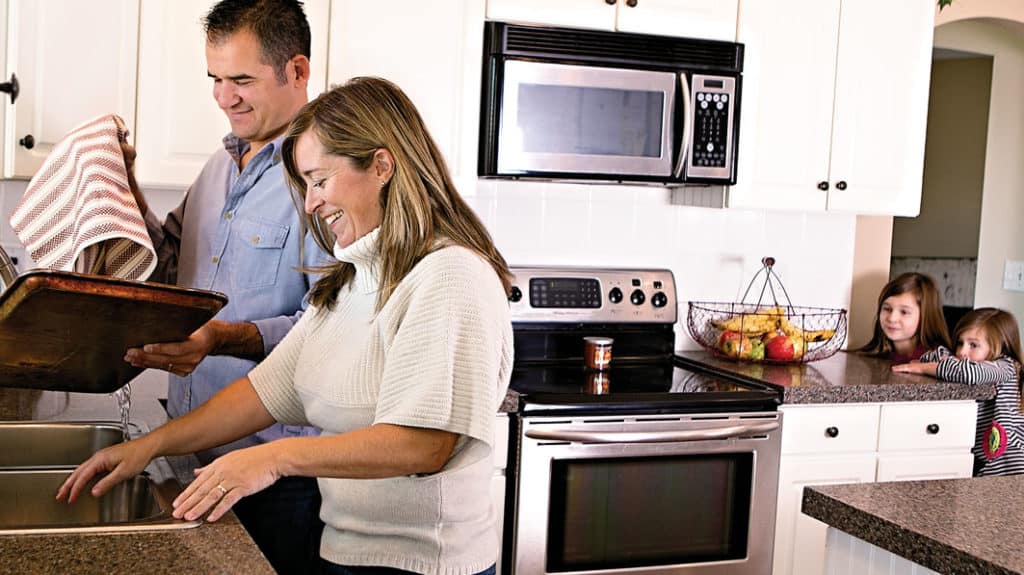
Is Your Daughter A Mean Girl?
Some are calling this breed the “New American Girl.” She’s more physical, not afraid to be aggressive or go after what she wants, and she takes care of herself.

How is your marriages equipping your kids with the skills they need for interacting with their future spouses?
I watch Holland, my 9-year-old daughter, take tentative steps around the house in my high heels, a favorite scarf of mine draped around her neck in a loose approximation of how I’d worn it earlier that day. Later, she helps her dad, Nick, in the kitchen, observing as he swishes sliced leeks in a bowl of water to remove the grit. Then she assumes the task.
Our every move seems to be an unintentional lesson in how to do things. This is also true when it comes to relationships, and no relationship influences Holland’s estimation of how humans should behave toward one another more than my marriage. She watches how Nick and I interact, discerns what defines our relationship, and again and again notes, So that’s how it’s done.
Someday, she’ll be walking in my shoes. Not just literally, but figuratively, in her role as an adult, perhaps a wife, a mom. Your kids will follow in your footsteps, too.
So how are our marriages equipping our kids with the skills they need? What are those relationship lessons we’re teaching? I’ll go first.
In my home, some of the most heated arguments happen during the news. Reports spark lively conversation and, sometimes, more lively arguments. Holland observes, and I don’t think that’s bad. Someday, perhaps most days, she’ll find herself disagreeing with someone. I want her to do this with respect and confidence. So we show her how it’s done.
We let Holland witness conflict to send the message that conflict is normal — it means that both people are human. What helps?
• Don’t let your child pick a side.
• Stay out of kid earshot when disagreements involve money, parenting or sex.
• Avoid moralizing arguments that have nothing to do with morality. Kids see in black and white, so help them recognize that not every disagreement stems from right vs. wrong.
• Don’t let your child equate resolution with one particular parent always getting his or her way. You wouldn’t want to send the message that one of you is a pushover and the other is a bully, right?
There are times when Nick and I are something less than respectful toward each other. For instance, we can occasionally be heard telling each other, “That is the worst idea I’ve ever heard.” When we rashly say whatever comes to mind, our unfiltered comments aren’t always pretty. And when they’re not, our daughter sees us model how to acknowledge we’ve crossed the line — and how to apologize. What helps?
• When an argument disintegrates, heading out of earshot is wise. But reappear for the resolution — model asking for and granting forgiveness.
• Be sincere. If you sulk and avoid eye contact after “making up,” what message does that send about the hollow nature of apologies and forgiveness?
• Tempting as it is to point fingers, focus on your own part in the argument, rather than your spouse’s.
Once a year, my husband travels 800 miles to go camping in the dead of winter with a group of his buddies. One year, this trip coincided with my getting the type of flu that renders otherwise-competent parents completely useless. He stayed home. And he didn’t make me feel terrible about it.
Sometimes relationships require that of us — to be disappointed that the task in front of us is ours, but to do it anyway. What helps?
• It’s good for kids to see that problems happen and you’re committed to solving them together.
• Avoid keeping score: “I covered for you last week, so I expect you to _____ .” This kind of record keeping makes being there for each other look more like indebtedness than commitment.
• Acknowledge your spouse’s commitment in front of the kids: “I know things have been rough at work lately, and I really appreciate the way you provide for us.”
We don’t go out on leave-the-house dates often, but we enjoy date nights at home, which frequently involve cheese fondue. Holland likes cheese and recognizes these cheesy after-her-bedtime dates are something good she’s not included in. More important, she sees us making time, space and grocery lists to nurture our relationship.
We’re showing our daughter that marriage is worth aspiring to. She notices that we enjoy spending time together, have someone to talk to and hug — and we get to have nightly slumber parties in a bed much bigger than hers, which is almost as appealing to her as cheese. What helps?
• It’s easy to misplace the fun aspects of marriage and send the message that marriage is dullsville. Occasionally, ditch responsibilities and go out for ice cream to say, Yes, marriage is chores and bill paying … but it’s also a hot-fudge sundae!
• You’ve heard it before: Don’t bad-mouth your spouse. This conveys little respect for your spouse or your marriage.
At this point, I’d like to say, “Nothing more to see here, folks. Move along and quit being so nosy.” But I know it’s time to come clean, so here are the negative lessons I’ve realized I’m teaching our daughter about relationships.
Although I never intended for Holland to infer this, she has. Recently she asked, “Mom, who are your best friends … besides Dad?” She doesn’t always see me making relationships outside of my marriage a priority. Yet I know we need the support of a larger community to thrive as a couple and a family, and I want our daughter to witness us investing in the lives of others, even when it feels inconvenient. We need to make some changes, and this suggestion from Erin Smalley and Carrie Oliver’s Grown-Up Girlfriends seems like a good place to start: “Leave room in your schedule for friends. It is so easy to make the blanket statement that ‘I’m just too busy.’ Sure, you’re busy, but what are some creative ways you could make space in your schedule for friends?”
You know those days when your spouse comes home cranky, then in response, you become a ray of sunshine, maintain your good mood and cheer him or her up? Uh-huh.
More often, if my husband comes home prickly, not only do I end up in the dumps, but I’m also perturbed at him for taking me there. This teaches my child that someone other than me is responsible for my happiness. As Drs. Les and Leslie Parrott write in Making Happy, “It’s not his or her job to make you happy. Happiness is an inside job.”
Going forward, we’ll try this emotional redirect from relational expert Ken Sande:
Recognize your emotions.
Evaluate their source.
Anticipate the consequences of following them.
Direct them on a constructive course.
Parents, our kids are watching. Along with our shoes, they’re picking up our attitudes and behaviors and trying them on for size. Consider what relationship lessons — good and bad — your kids are learning from your marriage.